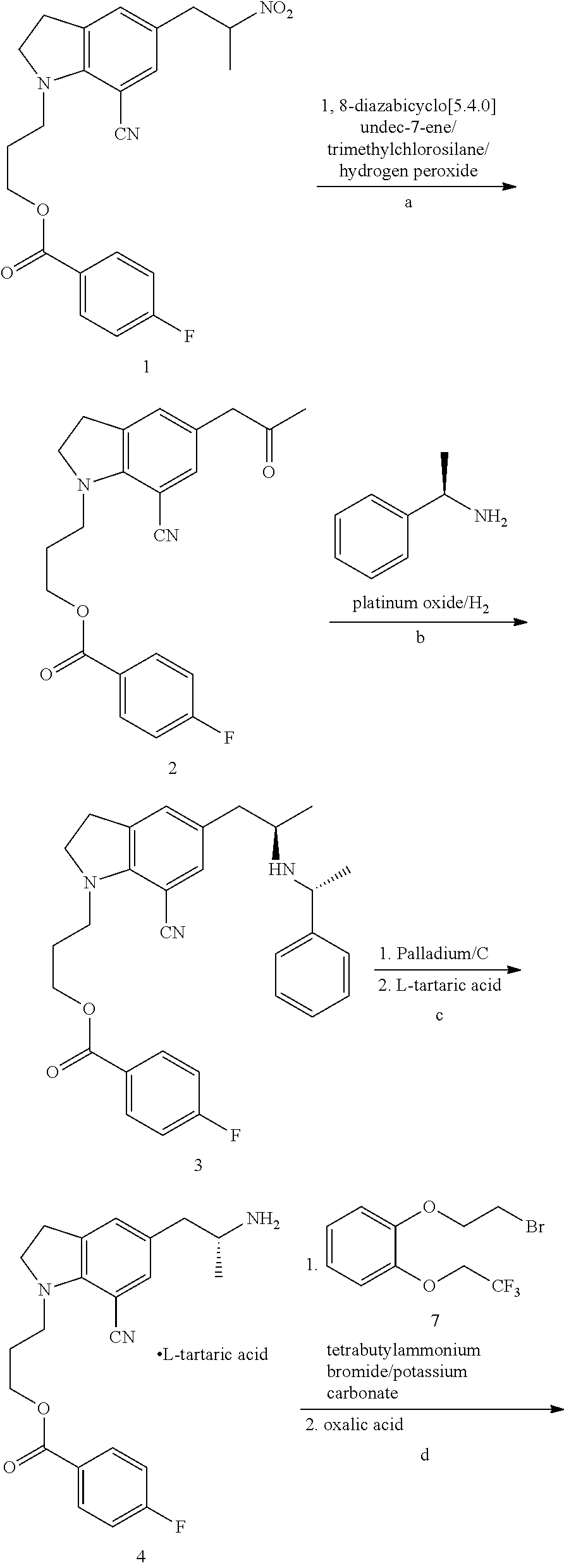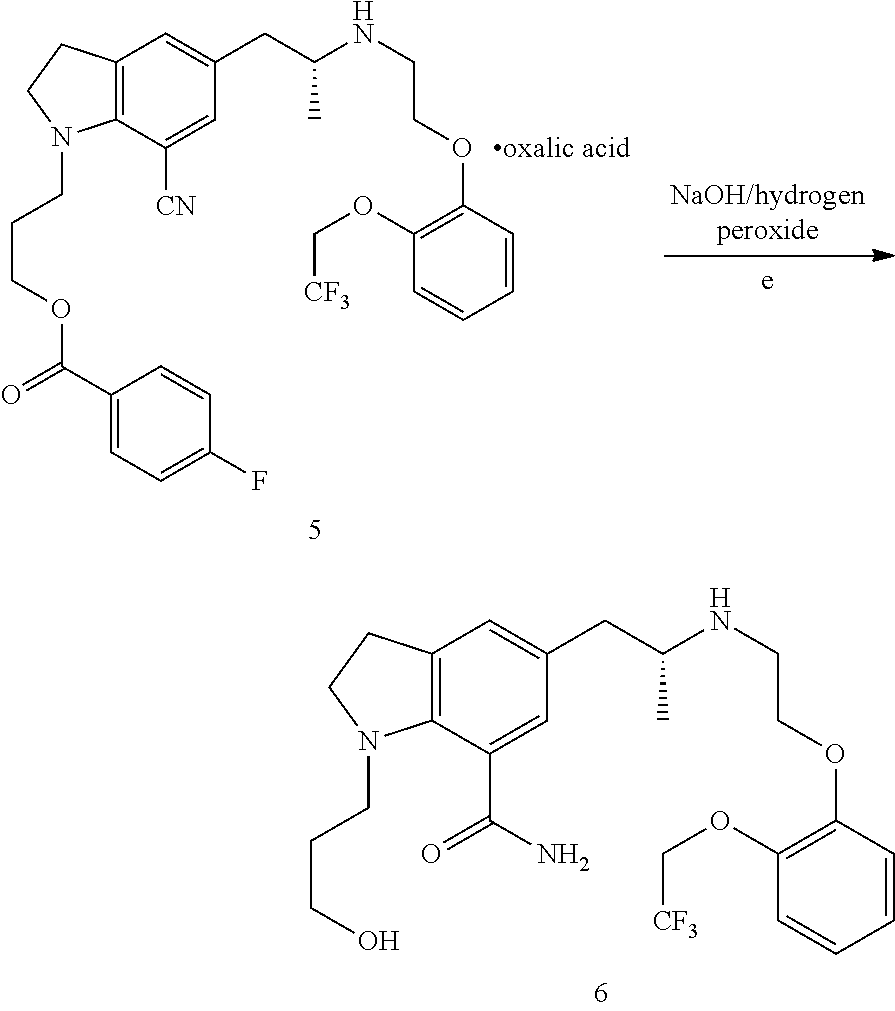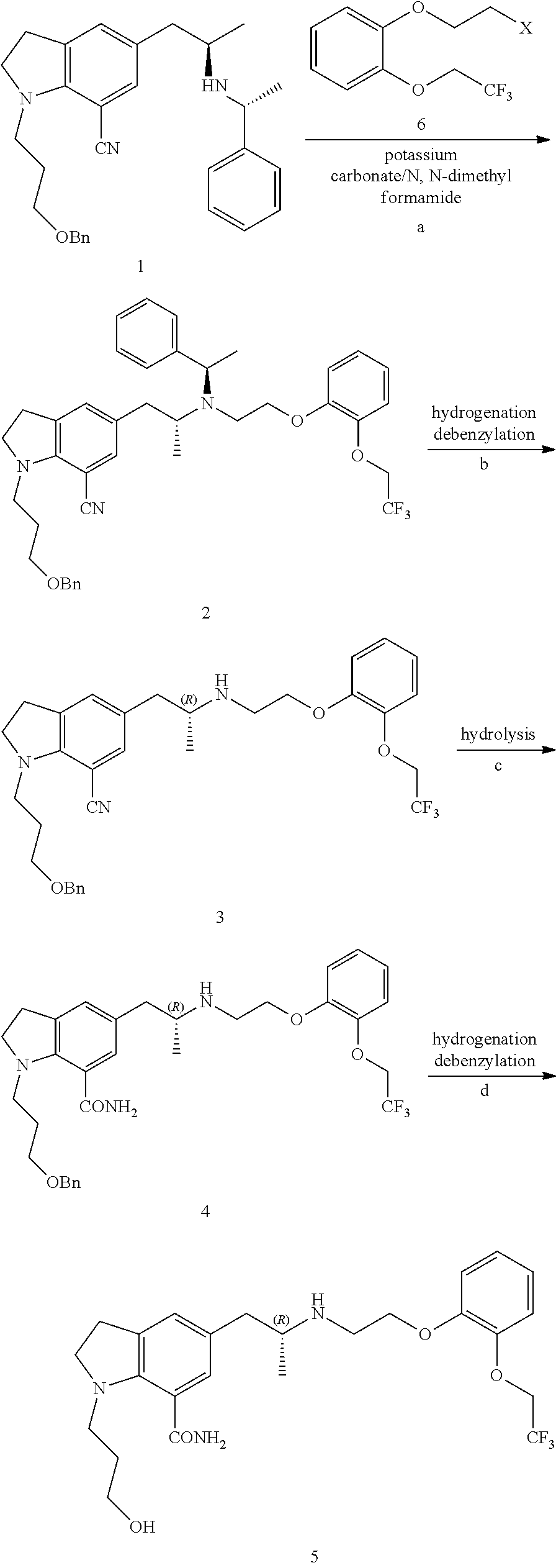Method for preparing silodosin and intermediate thereof
a silodosin and intermediate technology, applied in the field of pharmaceutical chemistry, can solve the problems of low yield of step c (33.4%), low ee value, low yield of step d, etc., and achieve the effect of high de value, simplified procedure, and high yield
- Summary
- Abstract
- Description
- Claims
- Application Information
AI Technical Summary
Benefits of technology
Problems solved by technology
Method used
Image
Examples
example 1
Preparation of 3-(7-cyano-5-(2-oxopropyl)-1-H-indolyl)propyl 4-fluorobenzoate (compound VIII, wherein R is 4-fluorobenzoyl)
[0028]150 g (0.365 mol) 3-(7-cyano-5-(2-nitropropyl)-1-H-indolyepropyl 4-fluorobenzoate (compound VII, wherein R is 4-fluorobenzoyl) was dissolved in 750 mL N,N-dimethyl formamide, and 88.7 g (0.583 mol) 1,8-diazabicyclo[5.4.0]undec-7-ene was added at 0-5° C., into which 118.8 g (1.094 mol) trimethylchlorosilane was then dropped at −15˜−10° C. After is dropping, reaction was conducted at −15˜−10° C. for 2 h. 66.1 g (0.383 mol) 30% hydrogen peroxide was then dropped into the reaction mixture. After dropping, reaction was conducted for 1 h. The reaction solution was poured into a separating funnel and the supernatant was removed. The reaction solution was then added to 1500 mL 1% sodium sulfite solution at about 10° C., extracted with 1500 mL methyl tertiary ether, and the aqueous phase was extracted with another 750 mL methyl tertiary ether. The combined organic ...
example 2
Preparation of 3-(7-cyano-5-((R)-2-(R)-1-phenylethylamino)propyl)-1-H-indolyl)propyl-4-fluorobenzoate (compound III, wherein R is 4-fluorobenzoyl)
[0029]137.6 g oily substance obtained in Example 1 was dissolved in 1280 mL tetrahydrofuran, and 44.2 g (0.365 mol) R-(+)-α-phenylethylamine, 1.376 g platinum oxide, and 21.9 g (0.365 mol) acetic acid were added. The reaction mixture was moved to a hydrogenation reactor, and reacted at a temperature of 55° C. and a hydrogen pressure of 8 atmospheric pressure. The reaction was conducted for 27 h. After the reaction was stopped, platinum oxide was filtered, and the filtrate was concentrated under reduced pressure. 1 L ethyl acetate and 1 L saturated brine were added to the concentrate and sodium carbonate was used to adjust the pH value to 7˜8. Separated, wherein the aqueous phase was extracted with 500 mL ethyl acetate for one time, and the organic phase was washed with 1 L saturated brine for one time. The combined organic phase was dried ...
example 3
Preparation of L-tartaric Acid Salt of 3-(7-cyano-5-((R)-2-(R)-1-phenylethylamino)propyl)-1-H-indolyl)propyl-4-fluorobenzoate (compound II, wherein R is 4-fluorobenzoyl, the Organic Acid is L-tartaric Acid)
[0030]84.8 g oily substance obtained in Example 2 was dissolved in 424 mL acetone, and 21.9 g L-tartaric acid (0.150 mol) was added under stirring, the reaction mixture was heated under reflux for 2 h, and then cooled to room temperature to crystallize for 2 h. Subsequently, the reaction mixture was filtered and washed with 80 mL acetone, and then dried in vacuum, to obtain a white solid (64.5 g). The mass spectrum showed a molecular ion peak wherein [M+1] is 486. By calculating from compound VIII, the yield of the three steps is 55.6%. HPLC purity is 99.0%. The de value of (R,R) configuration and (R,S) configuration is 99.1%.
[0031]1H NMR spectrum (DMSO-d6): δppm 1.0(3H,s), 1.5(3H,s), 2.0(2H, s), 2.7-3.1(4H, m), 3.4-3.7 (4H, m), 3.9-4.5 (5H, m), 6.7-6.8 (2H, m), 7.1-7.7 (7H, m), 7...
PUM
| Property | Measurement | Unit |
|---|---|---|
| temperature | aaaaa | aaaaa |
| temperature | aaaaa | aaaaa |
| mass | aaaaa | aaaaa |
Abstract
Description
Claims
Application Information
 Login to View More
Login to View More - R&D
- Intellectual Property
- Life Sciences
- Materials
- Tech Scout
- Unparalleled Data Quality
- Higher Quality Content
- 60% Fewer Hallucinations
Browse by: Latest US Patents, China's latest patents, Technical Efficacy Thesaurus, Application Domain, Technology Topic, Popular Technical Reports.
© 2025 PatSnap. All rights reserved.Legal|Privacy policy|Modern Slavery Act Transparency Statement|Sitemap|About US| Contact US: help@patsnap.com



